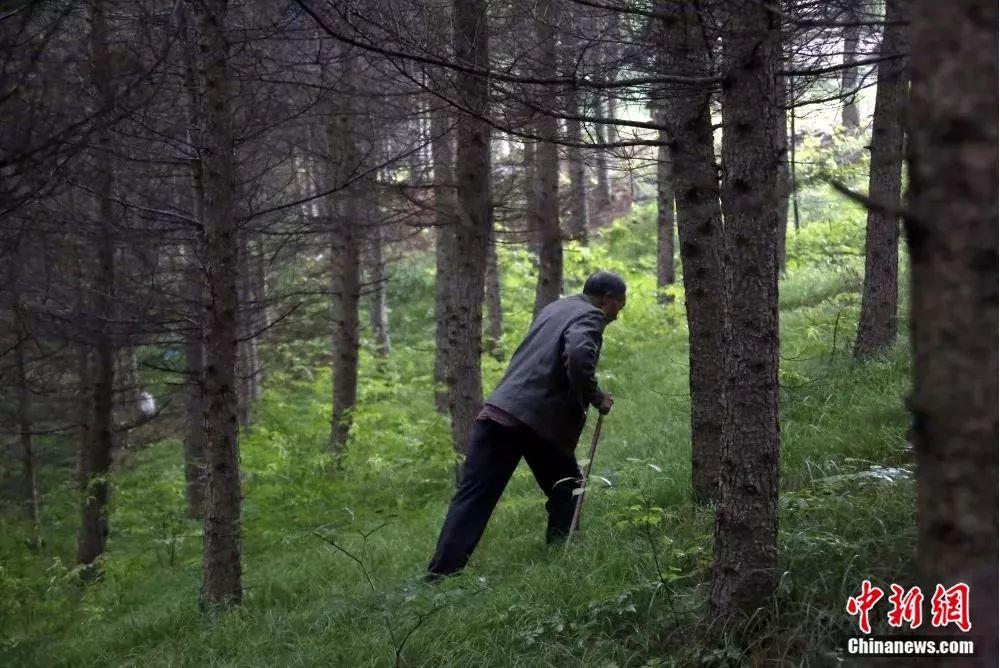(Peoples Daily Online)16:49, July 30, 2019

Tian Yongping stands in the woodland. (Photo/Chinanews.com)
A one-legged Chinese man named Tian Yongping has planted over 1,000 mu (about 66.7 hectares) of trees in his hometown over the past 32 years, hoping to contribute to the protection of the ecological environment of the local area, WeChat account of China News Service reported on July 28.
Tian is a villager in Tianchi Village, Tianchi Township, Wenxian County, Longnan City of northwest China鈥檚 Gansu Province. He dropped out of school and became a lumberjack at the age of 19, as he wanted to help relieve the economic pressure on his parents.
In 1984, Tian lost his left leg in an accident during work and lived in despair for quite a long time. Thanks to encouragement from his wife Xiong Chengxiu, who was his fianc茅e then, Tian went to southwest China鈥檚 Chengdu the following year to get himself a prosthetic leg, and started to learn the cutting propagation technique in the city, intending to make a living on the skill.
Tian eventually decided to return his hometown and plant trees. 鈥淚 had cut down so many trees. Only by planting new trees can we recover the ecological environment of the area back to its previous condition,鈥?said Tian, explaining why he changed his ideas back then.

Tian walks in the woodland near Tianchi Lake with a walking stick (Photo/Chinanews.com)
Tian and his wife began their tree planting journey in 1987, and haven鈥檛 stopped ever since. Every morning, Tian gets up at around 6 o鈥檆lock, and then walks to the woodland near Tianchi Lake of his hometown with a walking stick, carrying food for the day.
The woodland is 3 kilometers away from his home, yet it is a difficult trip for Tian, as it is extremely difficult for a man like him, who walks with a stick and a prosthetic leg, to climb up and down the mountain. In rainy days, it takes Tian about 2 hours to get to the cabin in the woodland.
All of the saplings Tian planted were from the local government. Every spring over the past 32 years, Tian would go to the township government office, and ask to get as many saplings as possible.
At first, the water needed for watering the trees was all carried to the mountain by Tian and his wife, which was a tough job. Later in 1994, the couple found a small pool at the hillside, and thus enhanced their resolve to carry on the task.
鈥淲e were so excited about the discovery for several days,鈥?said Xiong, disclosing how happy they were to find the water source. After the problem of sources of water and saplings had been solved, they started to spend more efforts to plant trees, working day and night.
As he can鈥檛 keep down with the prosthetic leg, Tian would often get down on one knee to dig holes. Sometimes he would dig holes with his bare hands, as he felt the tools were too long and not convenient to use when he knelt down.
In order to save more time for work, Tian and his wife built a simple cabin on the woodland of the mountain, and lived there for 32 years. 鈥淭hinking about how the saplings are all going to survive and become trees, we are satisfied with our life,鈥?said Tian.
When Tian almost spent all his savings on planting trees, he tried to figure out how to make a living. Finally, he thought of the idea of growing polyporus umbellatus, a material of Chinese medicine, under the trees, which has proven to be a success.

Tianchi Township (Photo/Chinanews.com)
By 2003 when China rolled out the policy on returning the grain plots to forestry, Tian鈥檚 woods had already taken shape, with the diameter of some trees reaching around 20 centimeters.
During the past 32 years, Tian wore out 12 prosthetic legs, planted more than 1,000 mu of trees near Tianchi Lake, and taught his fellow villagers how to grow Chinese medicinal crops in woods.
鈥淚t鈥檚 not good enough to live a better-off life myself. I want to try my best to help my fellow villagers live a better life,鈥?said Tian, explaining that he hopes his fellow villagers can shake off poverty and live a better life through hard work.
鈥淭eaching one to fish is better than giving him fish,鈥?said Tian, who was given the title of 鈥渟elf-improvement model of Gansu Province鈥?in 2014.
At present, Tian鈥檚 main job is to patrol and manage the woodland as a forest ranger. Spending so much on the creation of the woods, Tian doesn鈥檛 want to see any wanton felling of trees. He hopes to see his hometown with greener mountains and clearer waters.
![]()





